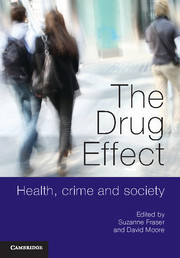Introduction
Constructing drugs and addiction
Summary
The title of this edited collection carries more than a hint of irony. It is clearly multiple. Drugs are often spoken of in terms of their physical or psychological ‘effects’. In turn, they are generally treated as the origins or causes of other entities, crime being perhaps one of the most widely assumed. In this respect, beyond the commonplace observation that drugs as substances have ‘effects’ in the body and on society, we can also say that the idea of drugs (their malign powers, their ability to corrupt and so on) itself has effects – at the level of politics and discourse. While the first of these two sets of meanings assumes drugs simply to be self-evidently concrete entities possessed of intrinsic characteristics and producing predictable results, the latter sees drugs and their effects as made in discourse, practice and politics: as constructed. This play on words is our attempt to signal the complexity of the issues canvassed in this collection, and the challenges and rewards that go along with holding these ideas simultaneously. This introduction aims to make this set of challenges and rewards clearer by elaborating key contemporary debates on the constructedness of reality and the nature of material objects, and considering how these ideas can illuminate issues of drug use and addiction.
Knowledge production on drugs, drug use and addiction has long been dominated by the sciences, and many argue that it is on this scientifically defined knowledge that policies and strategies for acting on drug use should be based. An influential trend in recent approaches to drug policy, for example, has been the call for ‘evidence-based policy’; that is, policy developed not, it is argued, through moralising approaches to drugs, but through what advocates see as the ‘objective’, unbiased findings of research. While this approach has several strategic benefits, it also has two weaknesses:
Its circularity. Its logic is complicit with neoliberal values of independence and rationality, values usually seen as incommensurate with drug use. This means it tends to promote the very attributes drug users are stigmatised as lacking.
Its epistemological naiveté. It tends to take for granted that value-free, objective knowledge about the world can be produced.
- Type
- Chapter
- Information
- The Drug EffectHealth, Crime and Society, pp. 1 - 16Publisher: Cambridge University PressPrint publication year: 2011
References
- 27
- Cited by



